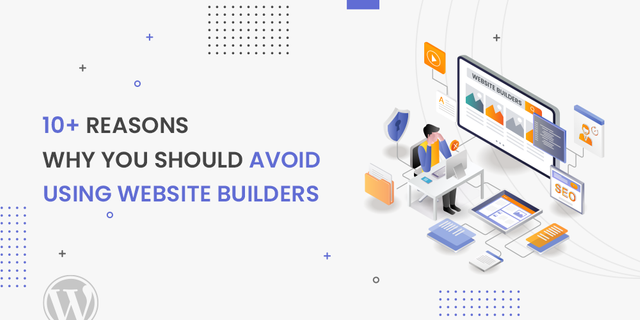
All entrepreneurs know and accept the importance of a good website. Every business, irrespective of size and scale, needs a user-friendly website with the necessary features and seamless performance.
It is one of the most effective online ways to make people familiar with the products or services you offer. But then, many startups find it expensive to hire a web design company to build a website, and therefore, they may opt for DIY website builders.
Whether you start a new business or facing tough times in this pandemic age, building a feature-rich website should be a priority to survive. However, it is difficult to make such a website on a limited budget or even for free.
Here DIY (Do it yourself) website builders come into the picture! Though they can assist you to create a website on your own for a fraction of the cost of a professionally built website, we will see the disadvantages of website builders in this article.
A well-built website can cost more money, but it is worthy as it will pay dividends for years to come. On the other hand, a website builder is relatively cheap but it can create problems in the long run for your business.
Here are the key shortcomings of DIY website builders.
What Are The Disadvantages Of Using A Website Builders?
1. No Uniqueness
DIY platforms have generic website templates. In other words, all websites built by using these templates will have the same navigation structure, layout, and styles. Entrepreneurs have limited ability to alter the design to make their websites unique. Such a similar website cannot stand out from the crowd and get failed to build your brand over the period. Branding needs a tremendous amount of customization regularly, which is impossible in the websites built by using DIY website builders.
2. Poor SEO
Search Engine Optimization (SEO) is essential for increasing the website’s visibility and higher ranking on SERPs (Search Engine Result Pages).Unfortunately, DIY website builders fail to offer strong SEO capabilities to business websites. Most DIY website builders do not allow Google to verify the respective website in their Webmaster Tools, which can hurt its search rankings badly.What’s more, most of such websites do not integrate with Google Analytics, and you may not get the important data related to the performance of your website.
3. Not Responsive
It is necessary for your business website to have a responsive design to ensure a good mobile experience.These days, mobile devices cover over 50% of all web traffic globally, and therefore, your website should be ready for mobiles and tablets. With responsive design, your website gets ready as per the size and dimensions of various screens. It also contributes to improving search rankings because Google also prioritizes websites with responsive designs.Most DIY websites are not responsive and give a poor performance on search engines.
4. Minimal Support
Your website has many components for ensuring proper functionality. If you fail to take care of these components, they may lead the business website to malfunction.
Some of the issues that occur because of this include-
- Visitors/users receive error messages on certain pages
- Website faces downtime
- Web pages take more time to load
- Various elements stop functioning
All such technical glitches need technical assistance in real-time, but DIY website builders provide very limited customer support and your website may remain down for a longer time.
5. No Ownership
This is one of the biggest disadvantages of DIY websites. Often, you cannot get ownership of the website you have built using a DIY website builder.
In many instances, the website builder may own the design and even content for your website. If you stop paying for their services, you may not use these assets.
As a result, you may have to build another website from scratch. Also, you cannot migrate the website to another server when it is created by a DIY builder.
Continue reading/ Source URL: https://www.solwininfotech.com/blog/wordpress/disadvantages-of-website-builders/